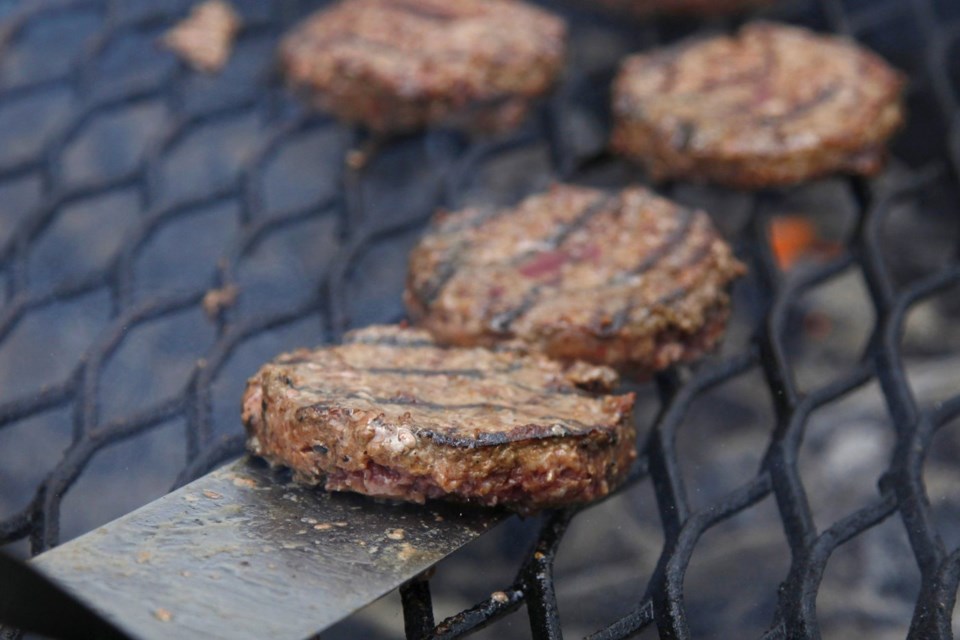Infused with the smell of smoke, any backyard burger tastes good when you’re surrounded by friends and family on a sunny summer day.
But a juicy, well-cooked, exceptional burger? That’s harder to pull off than tossing a patty on a grill.
“Meathead" Goldwyn, author of “Meathead, The Science of Great Barbecue and Grilling,” has spent a lifetime perfecting grilled burgers. On his website, , he offers exhaustive resources on burger tips, safety, buns, recipes, toppings, meat alternatives, history and more.
“As you can see, I’m into burgers,” he said.
Here’s his advice on how to transform your next grilled burger into the star of the barbecue.
High fat means more flavor
Most grillers recommend a mixture of 80% beef to 20% fat, but Goldwyn prefers even more fat, up to a 70:30 ratio. With more fat to drip on the heat source, more smoke seeps into the meat.
“Fat is flavor and it is also moisture, and that is especially important if you are cautious and cook it through as USDA recommends,” he said.
Ground beef sold in supermarkets is usually 90:10, which he said produces a dry burger. Instead, go to a butcher and ask for a coarse grind. Since it’s ground meat, the cut doesn’t matter, so don’t waste money on expensive ribeye or filet.
What to mix in, and what to leave out
Many burger purists say, put too many ingredients into the meat and you end up with meatloaf. Goldwyn acknowledges high-quality beef doesn’t need much else, but he suggested a few mix-ins to build flavor.
One is finely chopped bacon, which you can ask the butcher to include in the grind. A small amount of dry spices, black pepper, or garlic and onion powders also go a long way. Stir in everything with a fork to keep the mixture loose; mashing it with your hands will make the burger dense.
Although some recipes call for adding chopped bell pepper or onion to the ground meat, Goldwyn urged caution. Fresh vegetables contain a lot of moisture, and too much makes the burger fall apart. But he said finely chopped onion adds a nice sweetness without compromising the patty’s integrity.
Do not mix salt into the meat
Salty meat is delicious, but Goldwyn said it’s a mistake to add salt to the grind before forming patties. Salt draws out moisture, which makes the meat contract and results in a tougher, drier burger, he said.
He credits an MIT graduate and cookbook author , for teaching him to leave out salt. But Goldwyn partnered with a Boston University engineer to run his own tests and came up with the same findings.
“It makes the meat harder, which is opposite of what you want,” he said.
Instead, salt the burgers generously right before grilling, with a teaspoon of kosher or coarse sea salt per pound.
Making the right patty
When cooking for a crowd, Goldwyn prefers 5- to 6-ounce patties, which are large enough that most people eat just one but small enough that they cook quickly. Per pound of meat that translates to three 4 1/2-inch patties that are about 3/4 inch thick.
Form the patties with dry hands. Using wet hands, which is sometimes advised, adds surface moisture that inhibits flavorful browning on the grill.
When it comes time to grill, cook the burgers directly over medium-high heat. Keep the grill open and flip every two minutes, two factors that speed cooking, “which reduces moisture loss and builds a better crust,” he said.
A word on toppings — and bottomings
For Goldwyn, sauce goes on the bottom bun so it mixes with the meat juices. His “glop sauce,” a spin on McDonald’s Big Mac “special sauce,” has oil that protects the bottom bun from soaking through and falling apart.
He swears by classic American cheese slices, which melt easily. Add it a minute or two before the burger's cooked, and cover with an upside-down pan to capture the heat.
Other than that, toppings are limitless, but you can’t go wrong with lettuce and tomato.
“You don’t need to make it more complicated than it is,” he said. “Seasoned properly and cooked properly, it’s just freaking delicious.”
Servings: Six 5- to 6-ounce patties
For the meat:
2 pounds ground steak, such as chuck, brisket, sirloin or hangar, 20 to 30 percent fat 1/2 teaspoon freshly ground black pepper 1/2 teaspoon onion powder 1/2 teaspoon garlic powder (not garlic salt)
In a small bowl, mix the pepper, garlic and onion. In a large bowl, add the meat and sprinkle in some of the spice mix, stir it with a fork to keep it fluffy. Add the rest of the mix and stir to combine.
With dry hands, form the patties to about 4 1/2 inches wide and 3/4 inch thick. Refrigerate until ready to grill.
Just before grilling, season the exterior generously with salt. Spread both sides with a thin layer of oil. Cook directly over medium-high heat, flipping at least three times until cooked in the center.
For the sauce:
1/2 cup mayonnaise 1/2 cup Kansas City style barbecue sauce or ketchup 3 tbsp yellow ballpark style mustard 1 tbsp hot sauce, such as Tabasco chipotle 1/2 tsp kosher salt 1/4 tsp garlic powder
Whisk everything together in a small bowl until smooth.
Serve the burgers on high-quality soft buns, buttered and toasted for texture and flavor. Smear the sauce on the bottom bun, then top with the burger and toppings.
___
EDITOR’S NOTE: Albert Stumm writes about food, travel and wellness. Find his work at
Albert Stumm, The Associated Press



